Contract Law Case Study: Unconscionable Conduct and Undue Influence
VerifiedAdded on 2023/01/05
|6
|1670
|52
Case Study
AI Summary
This case study analyzes a contract law dispute involving Antonio and David, focusing on the concept of unconscionable conduct under Australian law. Antonio, suffering from a mild intellectual disability and limited English reading comprehension, was induced by David to purchase a business based on false claims of its financial performance. David exploited Antonio's vulnerability by providing misleading financial statements and pressuring him to sign the contract without legal advice. The analysis examines the legal principles of unconscionable conduct, referencing relevant case law like Commercial Bank of Australia v Amadio, and explores factors such as bargaining power, good faith, and unfair practices. The study concludes that Antonio can likely set aside the contract due to David's unconscionable behavior, which meets the requirements of Australian Consumer Law, thus highlighting the importance of fairness and good faith in contractual agreements.
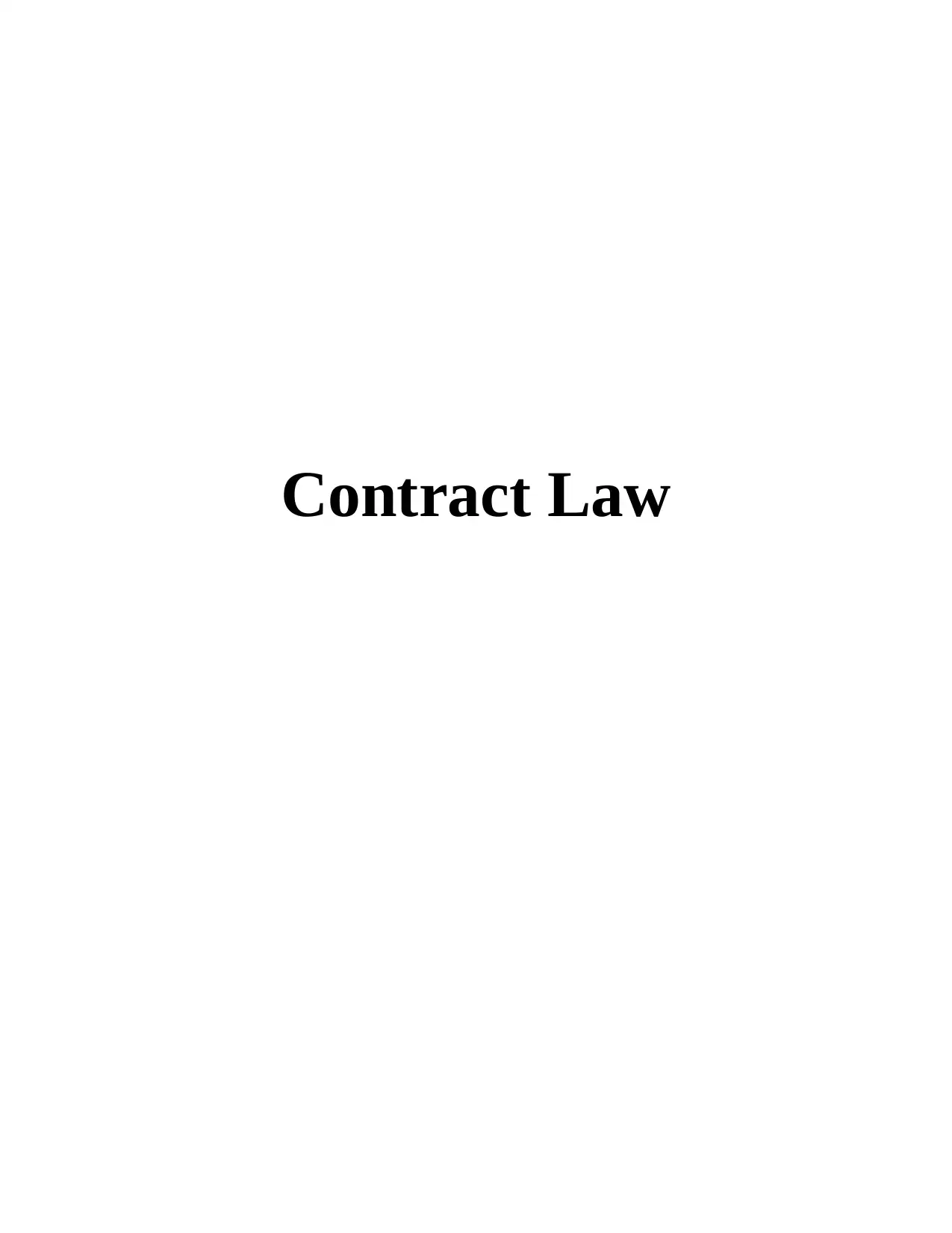
Contract Law
Paraphrase This Document
Need a fresh take? Get an instant paraphrase of this document with our AI Paraphraser
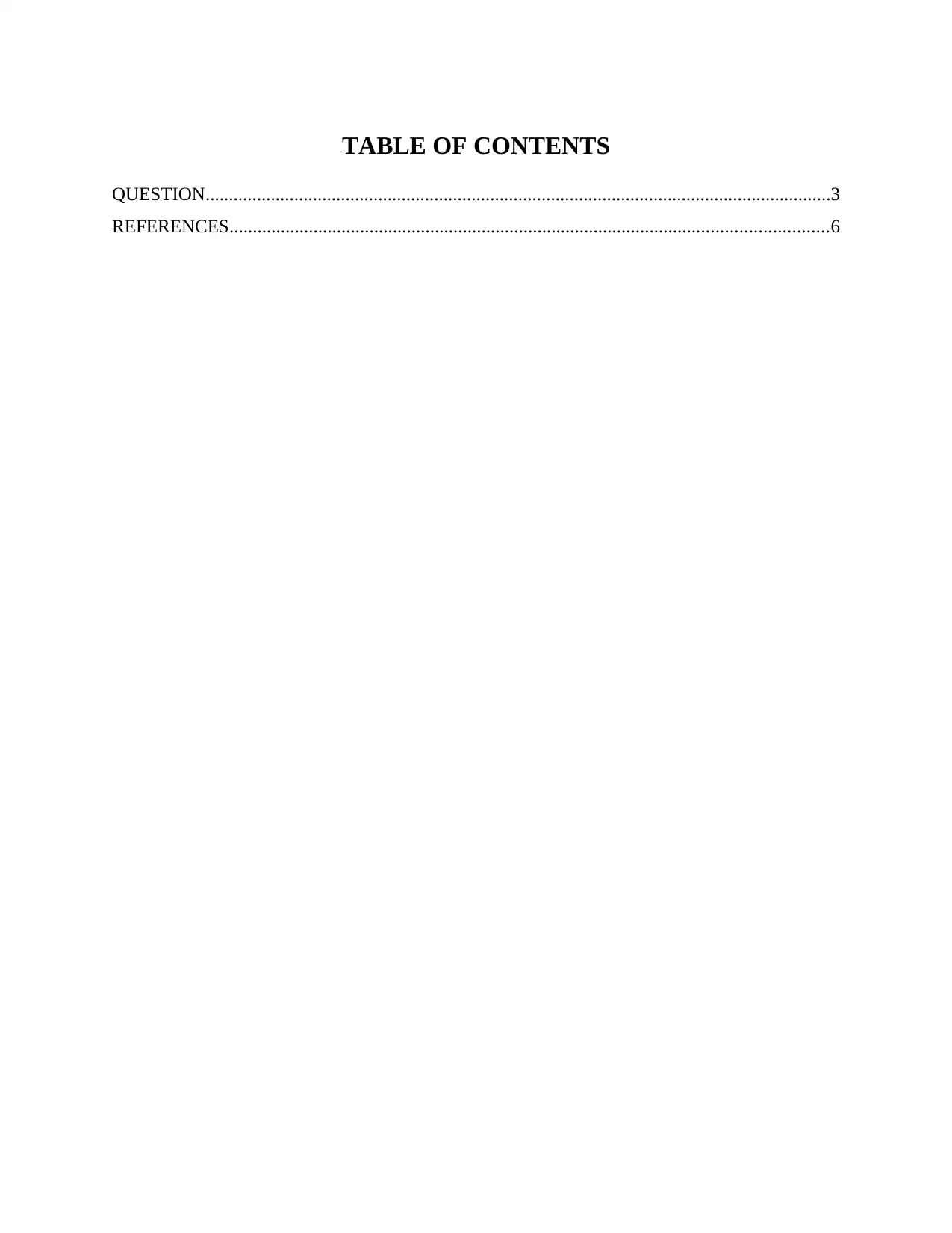
TABLE OF CONTENTS
QUESTION......................................................................................................................................3
REFERENCES................................................................................................................................6
QUESTION......................................................................................................................................3
REFERENCES................................................................................................................................6
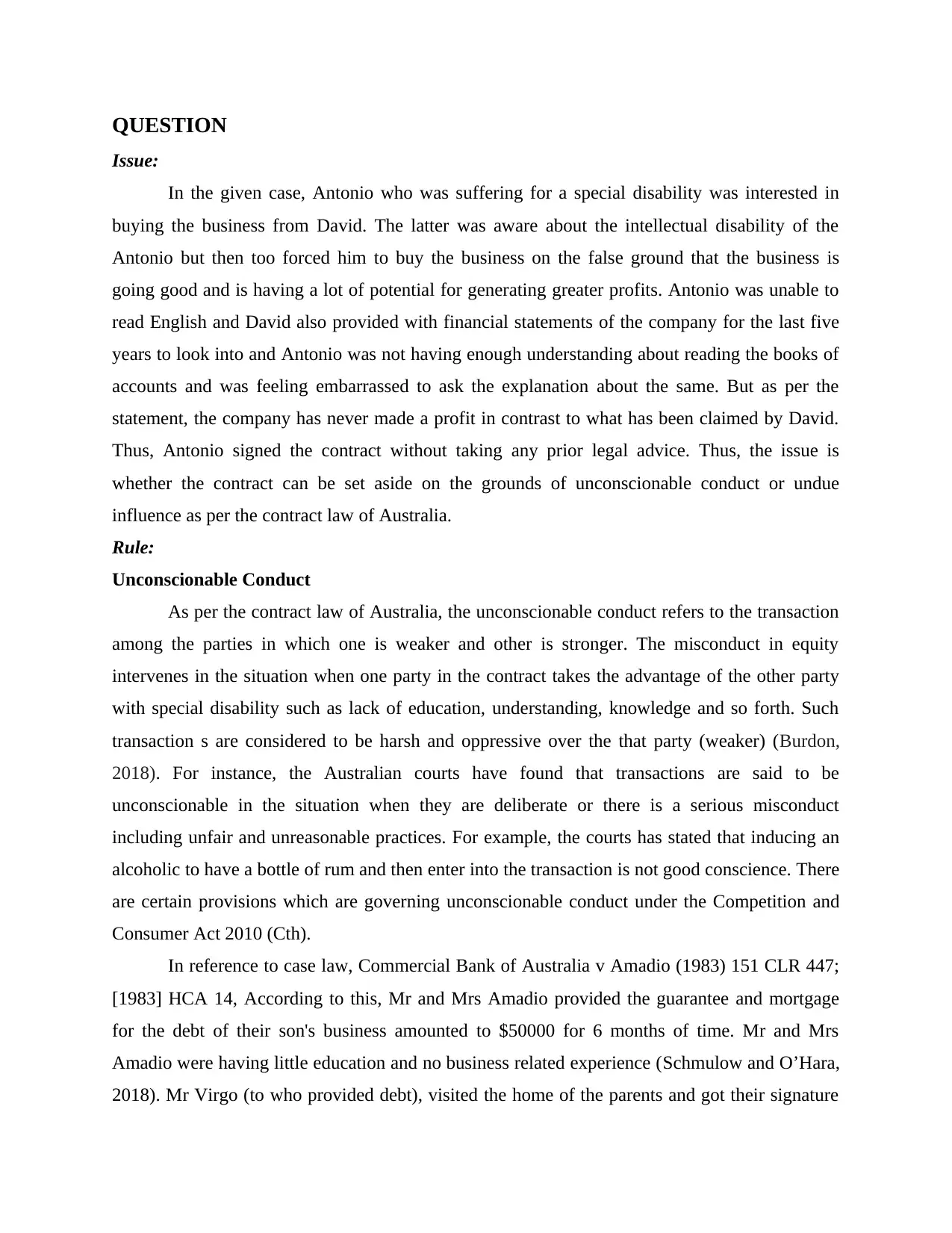
QUESTION
Issue:
In the given case, Antonio who was suffering for a special disability was interested in
buying the business from David. The latter was aware about the intellectual disability of the
Antonio but then too forced him to buy the business on the false ground that the business is
going good and is having a lot of potential for generating greater profits. Antonio was unable to
read English and David also provided with financial statements of the company for the last five
years to look into and Antonio was not having enough understanding about reading the books of
accounts and was feeling embarrassed to ask the explanation about the same. But as per the
statement, the company has never made a profit in contrast to what has been claimed by David.
Thus, Antonio signed the contract without taking any prior legal advice. Thus, the issue is
whether the contract can be set aside on the grounds of unconscionable conduct or undue
influence as per the contract law of Australia.
Rule:
Unconscionable Conduct
As per the contract law of Australia, the unconscionable conduct refers to the transaction
among the parties in which one is weaker and other is stronger. The misconduct in equity
intervenes in the situation when one party in the contract takes the advantage of the other party
with special disability such as lack of education, understanding, knowledge and so forth. Such
transaction s are considered to be harsh and oppressive over the that party (weaker) (Burdon,
2018). For instance, the Australian courts have found that transactions are said to be
unconscionable in the situation when they are deliberate or there is a serious misconduct
including unfair and unreasonable practices. For example, the courts has stated that inducing an
alcoholic to have a bottle of rum and then enter into the transaction is not good conscience. There
are certain provisions which are governing unconscionable conduct under the Competition and
Consumer Act 2010 (Cth).
In reference to case law, Commercial Bank of Australia v Amadio (1983) 151 CLR 447;
[1983] HCA 14, According to this, Mr and Mrs Amadio provided the guarantee and mortgage
for the debt of their son's business amounted to $50000 for 6 months of time. Mr and Mrs
Amadio were having little education and no business related experience (Schmulow and O’Hara,
2018). Mr Virgo (to who provided debt), visited the home of the parents and got their signature
Issue:
In the given case, Antonio who was suffering for a special disability was interested in
buying the business from David. The latter was aware about the intellectual disability of the
Antonio but then too forced him to buy the business on the false ground that the business is
going good and is having a lot of potential for generating greater profits. Antonio was unable to
read English and David also provided with financial statements of the company for the last five
years to look into and Antonio was not having enough understanding about reading the books of
accounts and was feeling embarrassed to ask the explanation about the same. But as per the
statement, the company has never made a profit in contrast to what has been claimed by David.
Thus, Antonio signed the contract without taking any prior legal advice. Thus, the issue is
whether the contract can be set aside on the grounds of unconscionable conduct or undue
influence as per the contract law of Australia.
Rule:
Unconscionable Conduct
As per the contract law of Australia, the unconscionable conduct refers to the transaction
among the parties in which one is weaker and other is stronger. The misconduct in equity
intervenes in the situation when one party in the contract takes the advantage of the other party
with special disability such as lack of education, understanding, knowledge and so forth. Such
transaction s are considered to be harsh and oppressive over the that party (weaker) (Burdon,
2018). For instance, the Australian courts have found that transactions are said to be
unconscionable in the situation when they are deliberate or there is a serious misconduct
including unfair and unreasonable practices. For example, the courts has stated that inducing an
alcoholic to have a bottle of rum and then enter into the transaction is not good conscience. There
are certain provisions which are governing unconscionable conduct under the Competition and
Consumer Act 2010 (Cth).
In reference to case law, Commercial Bank of Australia v Amadio (1983) 151 CLR 447;
[1983] HCA 14, According to this, Mr and Mrs Amadio provided the guarantee and mortgage
for the debt of their son's business amounted to $50000 for 6 months of time. Mr and Mrs
Amadio were having little education and no business related experience (Schmulow and O’Hara,
2018). Mr Virgo (to who provided debt), visited the home of the parents and got their signature
⊘ This is a preview!⊘
Do you want full access?
Subscribe today to unlock all pages.

Trusted by 1+ million students worldwide
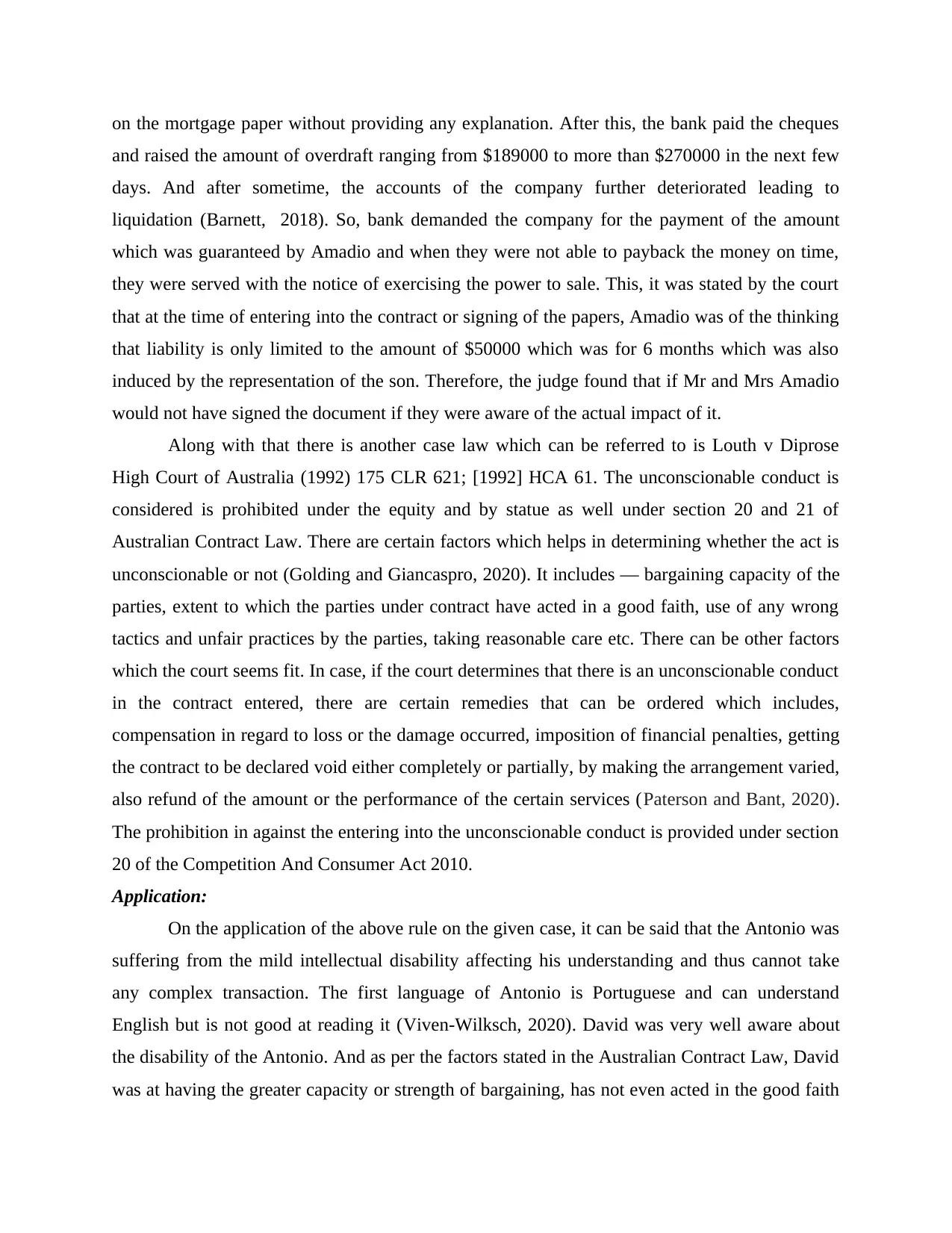
on the mortgage paper without providing any explanation. After this, the bank paid the cheques
and raised the amount of overdraft ranging from $189000 to more than $270000 in the next few
days. And after sometime, the accounts of the company further deteriorated leading to
liquidation (Barnett, 2018). So, bank demanded the company for the payment of the amount
which was guaranteed by Amadio and when they were not able to payback the money on time,
they were served with the notice of exercising the power to sale. This, it was stated by the court
that at the time of entering into the contract or signing of the papers, Amadio was of the thinking
that liability is only limited to the amount of $50000 which was for 6 months which was also
induced by the representation of the son. Therefore, the judge found that if Mr and Mrs Amadio
would not have signed the document if they were aware of the actual impact of it.
Along with that there is another case law which can be referred to is Louth v Diprose
High Court of Australia (1992) 175 CLR 621; [1992] HCA 61. The unconscionable conduct is
considered is prohibited under the equity and by statue as well under section 20 and 21 of
Australian Contract Law. There are certain factors which helps in determining whether the act is
unconscionable or not (Golding and Giancaspro, 2020). It includes — bargaining capacity of the
parties, extent to which the parties under contract have acted in a good faith, use of any wrong
tactics and unfair practices by the parties, taking reasonable care etc. There can be other factors
which the court seems fit. In case, if the court determines that there is an unconscionable conduct
in the contract entered, there are certain remedies that can be ordered which includes,
compensation in regard to loss or the damage occurred, imposition of financial penalties, getting
the contract to be declared void either completely or partially, by making the arrangement varied,
also refund of the amount or the performance of the certain services (Paterson and Bant, 2020).
The prohibition in against the entering into the unconscionable conduct is provided under section
20 of the Competition And Consumer Act 2010.
Application:
On the application of the above rule on the given case, it can be said that the Antonio was
suffering from the mild intellectual disability affecting his understanding and thus cannot take
any complex transaction. The first language of Antonio is Portuguese and can understand
English but is not good at reading it (Viven-Wilksch, 2020). David was very well aware about
the disability of the Antonio. And as per the factors stated in the Australian Contract Law, David
was at having the greater capacity or strength of bargaining, has not even acted in the good faith
and raised the amount of overdraft ranging from $189000 to more than $270000 in the next few
days. And after sometime, the accounts of the company further deteriorated leading to
liquidation (Barnett, 2018). So, bank demanded the company for the payment of the amount
which was guaranteed by Amadio and when they were not able to payback the money on time,
they were served with the notice of exercising the power to sale. This, it was stated by the court
that at the time of entering into the contract or signing of the papers, Amadio was of the thinking
that liability is only limited to the amount of $50000 which was for 6 months which was also
induced by the representation of the son. Therefore, the judge found that if Mr and Mrs Amadio
would not have signed the document if they were aware of the actual impact of it.
Along with that there is another case law which can be referred to is Louth v Diprose
High Court of Australia (1992) 175 CLR 621; [1992] HCA 61. The unconscionable conduct is
considered is prohibited under the equity and by statue as well under section 20 and 21 of
Australian Contract Law. There are certain factors which helps in determining whether the act is
unconscionable or not (Golding and Giancaspro, 2020). It includes — bargaining capacity of the
parties, extent to which the parties under contract have acted in a good faith, use of any wrong
tactics and unfair practices by the parties, taking reasonable care etc. There can be other factors
which the court seems fit. In case, if the court determines that there is an unconscionable conduct
in the contract entered, there are certain remedies that can be ordered which includes,
compensation in regard to loss or the damage occurred, imposition of financial penalties, getting
the contract to be declared void either completely or partially, by making the arrangement varied,
also refund of the amount or the performance of the certain services (Paterson and Bant, 2020).
The prohibition in against the entering into the unconscionable conduct is provided under section
20 of the Competition And Consumer Act 2010.
Application:
On the application of the above rule on the given case, it can be said that the Antonio was
suffering from the mild intellectual disability affecting his understanding and thus cannot take
any complex transaction. The first language of Antonio is Portuguese and can understand
English but is not good at reading it (Viven-Wilksch, 2020). David was very well aware about
the disability of the Antonio. And as per the factors stated in the Australian Contract Law, David
was at having the greater capacity or strength of bargaining, has not even acted in the good faith
Paraphrase This Document
Need a fresh take? Get an instant paraphrase of this document with our AI Paraphraser
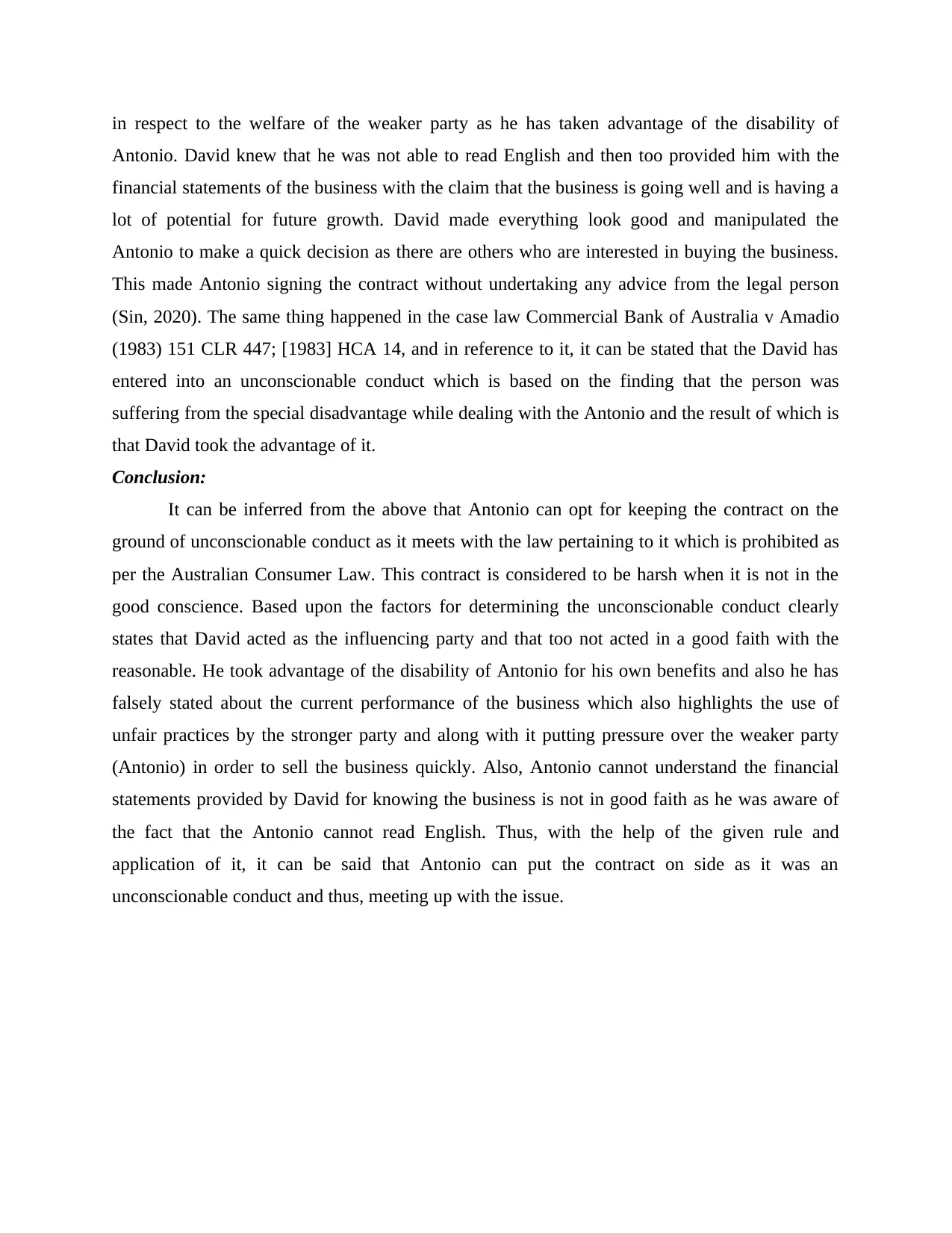
in respect to the welfare of the weaker party as he has taken advantage of the disability of
Antonio. David knew that he was not able to read English and then too provided him with the
financial statements of the business with the claim that the business is going well and is having a
lot of potential for future growth. David made everything look good and manipulated the
Antonio to make a quick decision as there are others who are interested in buying the business.
This made Antonio signing the contract without undertaking any advice from the legal person
(Sin, 2020). The same thing happened in the case law Commercial Bank of Australia v Amadio
(1983) 151 CLR 447; [1983] HCA 14, and in reference to it, it can be stated that the David has
entered into an unconscionable conduct which is based on the finding that the person was
suffering from the special disadvantage while dealing with the Antonio and the result of which is
that David took the advantage of it.
Conclusion:
It can be inferred from the above that Antonio can opt for keeping the contract on the
ground of unconscionable conduct as it meets with the law pertaining to it which is prohibited as
per the Australian Consumer Law. This contract is considered to be harsh when it is not in the
good conscience. Based upon the factors for determining the unconscionable conduct clearly
states that David acted as the influencing party and that too not acted in a good faith with the
reasonable. He took advantage of the disability of Antonio for his own benefits and also he has
falsely stated about the current performance of the business which also highlights the use of
unfair practices by the stronger party and along with it putting pressure over the weaker party
(Antonio) in order to sell the business quickly. Also, Antonio cannot understand the financial
statements provided by David for knowing the business is not in good faith as he was aware of
the fact that the Antonio cannot read English. Thus, with the help of the given rule and
application of it, it can be said that Antonio can put the contract on side as it was an
unconscionable conduct and thus, meeting up with the issue.
Antonio. David knew that he was not able to read English and then too provided him with the
financial statements of the business with the claim that the business is going well and is having a
lot of potential for future growth. David made everything look good and manipulated the
Antonio to make a quick decision as there are others who are interested in buying the business.
This made Antonio signing the contract without undertaking any advice from the legal person
(Sin, 2020). The same thing happened in the case law Commercial Bank of Australia v Amadio
(1983) 151 CLR 447; [1983] HCA 14, and in reference to it, it can be stated that the David has
entered into an unconscionable conduct which is based on the finding that the person was
suffering from the special disadvantage while dealing with the Antonio and the result of which is
that David took the advantage of it.
Conclusion:
It can be inferred from the above that Antonio can opt for keeping the contract on the
ground of unconscionable conduct as it meets with the law pertaining to it which is prohibited as
per the Australian Consumer Law. This contract is considered to be harsh when it is not in the
good conscience. Based upon the factors for determining the unconscionable conduct clearly
states that David acted as the influencing party and that too not acted in a good faith with the
reasonable. He took advantage of the disability of Antonio for his own benefits and also he has
falsely stated about the current performance of the business which also highlights the use of
unfair practices by the stronger party and along with it putting pressure over the weaker party
(Antonio) in order to sell the business quickly. Also, Antonio cannot understand the financial
statements provided by David for knowing the business is not in good faith as he was aware of
the fact that the Antonio cannot read English. Thus, with the help of the given rule and
application of it, it can be said that Antonio can put the contract on side as it was an
unconscionable conduct and thus, meeting up with the issue.
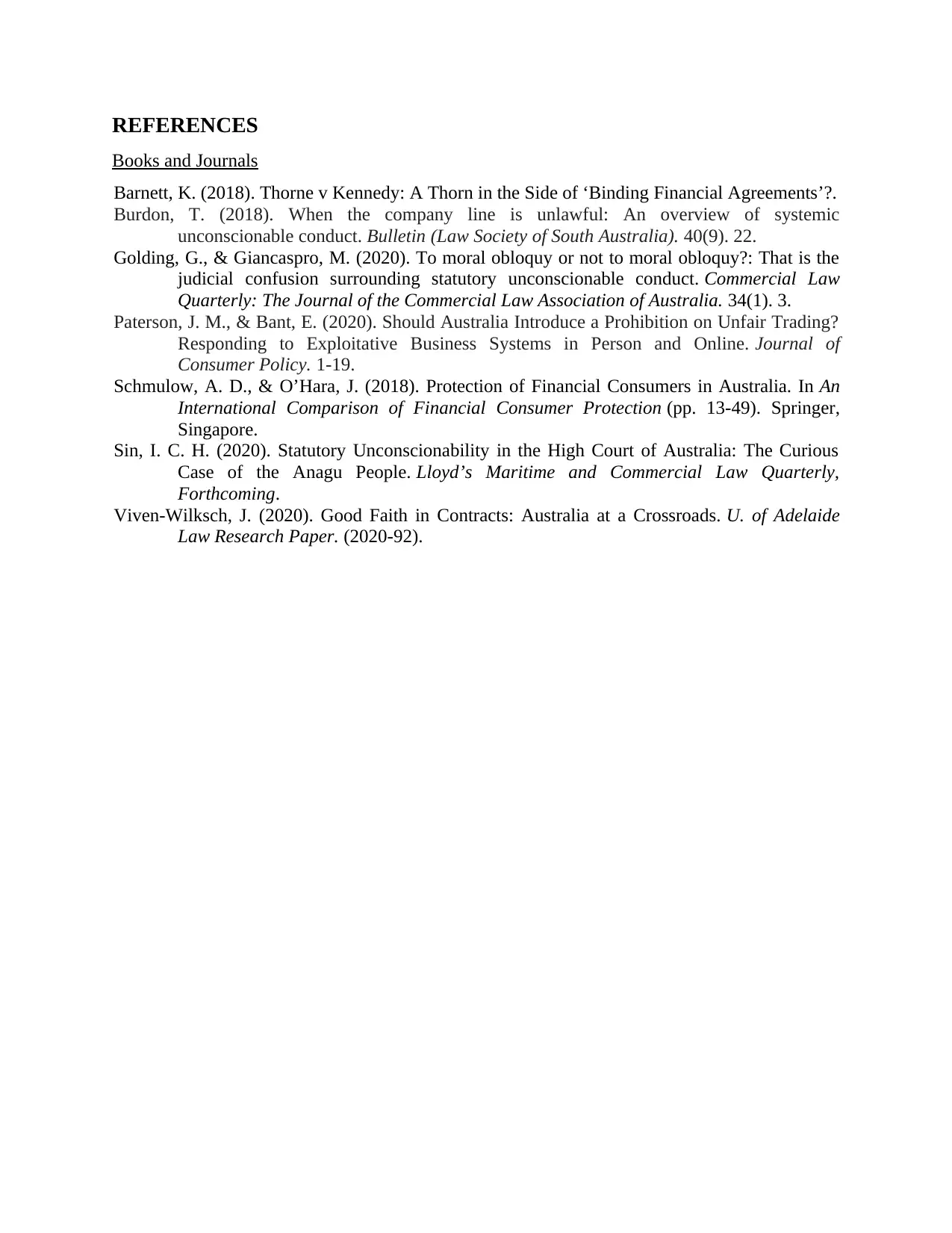
REFERENCES
Books and Journals
Barnett, K. (2018). Thorne v Kennedy: A Thorn in the Side of ‘Binding Financial Agreements’?.
Burdon, T. (2018). When the company line is unlawful: An overview of systemic
unconscionable conduct. Bulletin (Law Society of South Australia). 40(9). 22.
Golding, G., & Giancaspro, M. (2020). To moral obloquy or not to moral obloquy?: That is the
judicial confusion surrounding statutory unconscionable conduct. Commercial Law
Quarterly: The Journal of the Commercial Law Association of Australia. 34(1). 3.
Paterson, J. M., & Bant, E. (2020). Should Australia Introduce a Prohibition on Unfair Trading?
Responding to Exploitative Business Systems in Person and Online. Journal of
Consumer Policy. 1-19.
Schmulow, A. D., & O’Hara, J. (2018). Protection of Financial Consumers in Australia. In An
International Comparison of Financial Consumer Protection (pp. 13-49). Springer,
Singapore.
Sin, I. C. H. (2020). Statutory Unconscionability in the High Court of Australia: The Curious
Case of the Anagu People. Lloyd’s Maritime and Commercial Law Quarterly,
Forthcoming.
Viven-Wilksch, J. (2020). Good Faith in Contracts: Australia at a Crossroads. U. of Adelaide
Law Research Paper. (2020-92).
Books and Journals
Barnett, K. (2018). Thorne v Kennedy: A Thorn in the Side of ‘Binding Financial Agreements’?.
Burdon, T. (2018). When the company line is unlawful: An overview of systemic
unconscionable conduct. Bulletin (Law Society of South Australia). 40(9). 22.
Golding, G., & Giancaspro, M. (2020). To moral obloquy or not to moral obloquy?: That is the
judicial confusion surrounding statutory unconscionable conduct. Commercial Law
Quarterly: The Journal of the Commercial Law Association of Australia. 34(1). 3.
Paterson, J. M., & Bant, E. (2020). Should Australia Introduce a Prohibition on Unfair Trading?
Responding to Exploitative Business Systems in Person and Online. Journal of
Consumer Policy. 1-19.
Schmulow, A. D., & O’Hara, J. (2018). Protection of Financial Consumers in Australia. In An
International Comparison of Financial Consumer Protection (pp. 13-49). Springer,
Singapore.
Sin, I. C. H. (2020). Statutory Unconscionability in the High Court of Australia: The Curious
Case of the Anagu People. Lloyd’s Maritime and Commercial Law Quarterly,
Forthcoming.
Viven-Wilksch, J. (2020). Good Faith in Contracts: Australia at a Crossroads. U. of Adelaide
Law Research Paper. (2020-92).
⊘ This is a preview!⊘
Do you want full access?
Subscribe today to unlock all pages.

Trusted by 1+ million students worldwide
1 out of 6
Related Documents
Your All-in-One AI-Powered Toolkit for Academic Success.
+13062052269
info@desklib.com
Available 24*7 on WhatsApp / Email
![[object Object]](/_next/static/media/star-bottom.7253800d.svg)
Unlock your academic potential
Copyright © 2020–2026 A2Z Services. All Rights Reserved. Developed and managed by ZUCOL.





